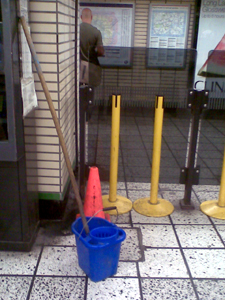We Come From Your Future: Dispatch Four 28 May 2008
Ultra-red

Next Stop
Field Composition Four: Next Stop
First stop: Cockfosters Tube Station.
In 2005 the cleaners at Cockfosters Station went on strike by simply not showing up for one of the last shifts of the year. This wildcat strike may be a small incident in the history of striking public transport workers. Absentism, refusing to work, may be dismissed as a strategy too simple to be called politics. Something else makes this incident part of a much larger story.
Years before, in cities across the U.S., migrant janitors began going on strike and fought for, what the British filmmaker Ken Loach captured in his film, "Bread and Roses." The title comes from a tradition of struggles, acclaimed by feminism, which challenges the limits of who the worker is, of where the struggle takes place, of what the struggle is about. Labour must be about more than minimum wages. A wage must provide more than subsistence. Happiness, joy in the sensuous, whether visual, tactile, smell or sound must also factor in the wages of labour. Thus, at the centre of the demand, is a desire for more - for something beyond an absence of exploitation.
Second stop: Baker Street Tube Station.
In early 2006, in the middle of the night while London slept, a group of workers assembled in the underground. Fused with excitement this meeting became the first gathering for planning what was to come. In the subsequent months, the workers launched a campaign of demonstrations, petitions, and the tactic of speaking through the media not to the media. Eventually the larger trade union apparatus of the T&G, the Transport and General Workers' Union, caught on. The Union adopted an organising strategy already initiated by the actions of cleaners across the city.
After mounting tremendous pressure, this combined effort forced Metronet, one of the contractors for London's public transport, to terminate the contract for the Blue Diamond union-busting cleaning firm. Emboldened by the success of their actions, the Tube cleaners arrived at an analysis: if public transportation is one site where the time and space of everyday life become compressed, then such a site offers a weak link in the chain of the capital city.
Next stop: Tottenham Court Road Tube Station.
The workers tell a story about how, a couple of years ago, Transport For London contracted Metronet and Tube Lines to manage London's public transport infrastructure. Labour relations have since changed. Contractors hire contractors who hire contractors who hire people. While contractors, Transport employees and a whole sector of civil employees are granted free use of the public transit system, those people hired to clean the underground receive no such fee waivers. Everyday, transport cleaners have to shell out money from their wages to purchase transit passes to get to the very underground sites they clean.
In addition to complaints over wages, the workers feel compelled to organise themselves due to the constant bullying and harassment from management, often the result of increasing pressure on companies to check workers' National Insurance numbers and passports. An atmosphere of anxiety intensifies as managers cooperate (and sometimes facilitate) immigration raids on the workers.
One T&G organiser tells how, from her experience, anti-immigrant raids are conducted as a form of retribution against workers who attempt to organise. The raids happen primarily among the smaller companies, while the large contractors, some of them subsidiaries of multinational corporations, get away untouched. But, as the organiser tells it, the cleaner contractors rely on undocumented workers. The corporate complicity in anti-migrant raids is not about compliance with government regulations but a deliberate strategy to intimidate workers. If Management and government deploy an affect of fear, workers make demands for the affect of joy. Thus at the heart of the demands made by the workers is a desire for more. They see that essentially, anti-racism is about more than the absence of racism.
We ask: What is the sound beyond the absence of racism?
Field Report Four by Ultra-red
Regularise Undocumented Workers
Dispatch TwoDay of Action to Abolish No Recourse to Public Funds
Dispatch ThreeMigrant Organising In The Rural South West
Dipatch FiveSounding Alexandra Court
Dispatch SixEcho-mining at Deptford Market
Online EpisodesFollow this link for an introduction to the project by Ultra-red as well as links to all audio compositions and texts.
